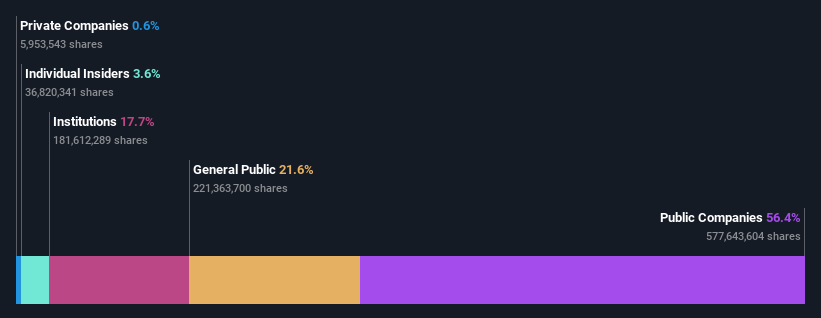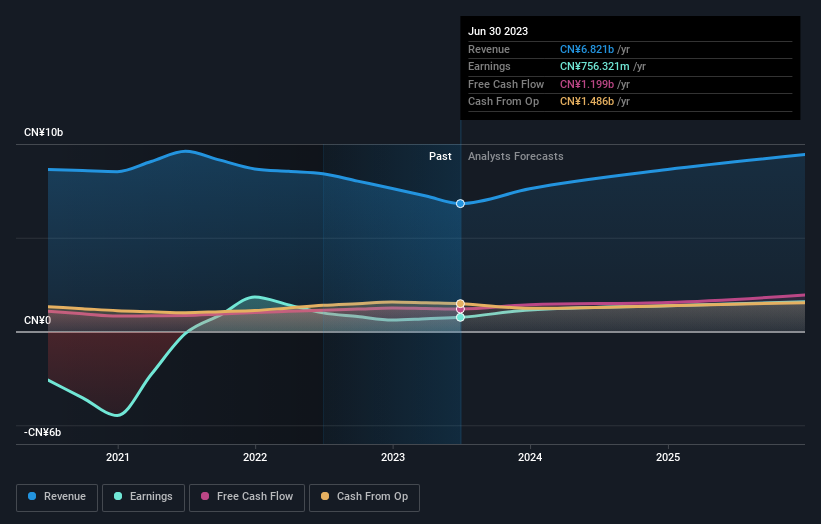China Literature Limited's (HKG:772) top owners are public companies with 56% stake, while 22% is held by individual investors
Key Insights
- Significant control over China Literature by public companies implies that the general public has more power to influence management and governance-related decisions
- 56% of the company is held by a single shareholder (Tencent Holdings Limited)
- Institutional ownership in China Literature is 18%
To get a sense of who is truly in control of China Literature Limited (HKG:772), it is important to understand the ownership structure of the business. The group holding the most number of shares in the company, around 56% to be precise, is public companies. That is, the group stands to benefit the most if the stock rises (or lose the most if there is a downturn).
Meanwhile, individual investors make up 22% of the company’s shareholders.
In the chart below, we zoom in on the different ownership groups of China Literature.
View our latest analysis for China Literature

What Does The Institutional Ownership Tell Us About China Literature?
Many institutions measure their performance against an index that approximates the local market. So they usually pay more attention to companies that are included in major indices.
China Literature already has institutions on the share registry. Indeed, they own a respectable stake in the company. This implies the analysts working for those institutions have looked at the stock and they like it. But just like anyone else, they could be wrong. It is not uncommon to see a big share price drop if two large institutional investors try to sell out of a stock at the same time. So it is worth checking the past earnings trajectory of China Literature, (below). Of course, keep in mind that there are other factors to consider, too.

Hedge funds don't have many shares in China Literature. The company's largest shareholder is Tencent Holdings Limited, with ownership of 56%. With such a huge stake in the ownership, we infer that they have significant control of the future of the company. For context, the second largest shareholder holds about 3.4% of the shares outstanding, followed by an ownership of 2.9% by the third-largest shareholder.
While studying institutional ownership for a company can add value to your research, it is also a good practice to research analyst recommendations to get a deeper understand of a stock's expected performance. Quite a few analysts cover the stock, so you could look into forecast growth quite easily.
Insider Ownership Of China Literature
While the precise definition of an insider can be subjective, almost everyone considers board members to be insiders. Management ultimately answers to the board. However, it is not uncommon for managers to be executive board members, especially if they are a founder or the CEO.
Insider ownership is positive when it signals leadership are thinking like the true owners of the company. However, high insider ownership can also give immense power to a small group within the company. This can be negative in some circumstances.
Our most recent data indicates that insiders own some shares in China Literature Limited. The insiders have a meaningful stake worth HK$970m. Most would see this as a real positive. It is good to see this level of investment by insiders. You can check here to see if those insiders have been buying recently.
General Public Ownership
The general public, who are usually individual investors, hold a 22% stake in China Literature. This size of ownership, while considerable, may not be enough to change company policy if the decision is not in sync with other large shareholders.
Public Company Ownership
Public companies currently own 56% of China Literature stock. It's hard to say for sure but this suggests they have entwined business interests. This might be a strategic stake, so it's worth watching this space for changes in ownership.
Next Steps:
It's always worth thinking about the different groups who own shares in a company. But to understand China Literature better, we need to consider many other factors. To that end, you should be aware of the 1 warning sign we've spotted with China Literature .
Ultimately the future is most important. You can access this free report on analyst forecasts for the company.
NB: Figures in this article are calculated using data from the last twelve months, which refer to the 12-month period ending on the last date of the month the financial statement is dated. This may not be consistent with full year annual report figures.
New: AI Stock Screener & Alerts
Our new AI Stock Screener scans the market every day to uncover opportunities.
• Dividend Powerhouses (3%+ Yield)
• Undervalued Small Caps with Insider Buying
• High growth Tech and AI Companies
Or build your own from over 50 metrics.
Have feedback on this article? Concerned about the content? Get in touch with us directly. Alternatively, email editorial-team (at) simplywallst.com.
This article by Simply Wall St is general in nature. We provide commentary based on historical data and analyst forecasts only using an unbiased methodology and our articles are not intended to be financial advice. It does not constitute a recommendation to buy or sell any stock, and does not take account of your objectives, or your financial situation. We aim to bring you long-term focused analysis driven by fundamental data. Note that our analysis may not factor in the latest price-sensitive company announcements or qualitative material. Simply Wall St has no position in any stocks mentioned.
About SEHK:772
China Literature
An investment holding company, operates an online literature platform in the People’s Republic of China.
Flawless balance sheet with moderate growth potential.
Similar Companies
Market Insights
Community Narratives



